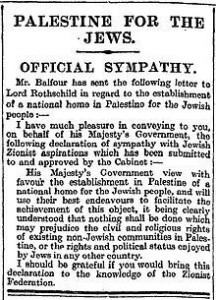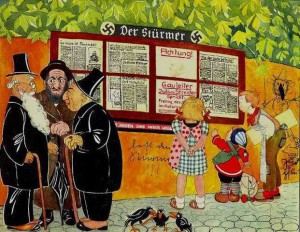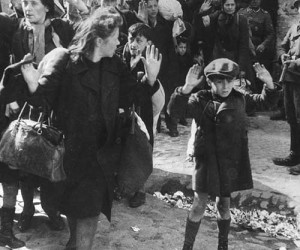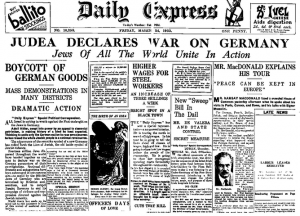“One cow in Palestine is worth more than all the Jews in Europe…”
Knowing who said this chilling statement (and why) is incredibly significant for an understanding of the true context of the Zionist project. But quotes like this, and other equally significant historic facts and realities (including Zionist complicity in the Holocaust itself), are largely hidden from mainstream discourse concerning the history of Zionism and the creation of the State of Israel.
Both the critics and supporters of Israel are guilty of propagating historical illiteracy about the origins and meaning of Zionism. Some anti-Israel activists see Zionism in super-simplistic terms as a source of all evil or as a Nazi-style ideology, while its defenders demonise or shut down anyone – Jewish or non-Jewish – who raises any questions.
The reality and the real history isn’t anything like as simple as either of those positions – real history never is.
There is, even now, a common misperception that the modern State of Israel was created in Palestine entirely as a reaction to the horrors of the Holocaust: that what was inflicted upon the Jews of Europe by the Nazis was the justification for creating the ‘Jewish Homeland’ – essentially a sanctuary or safe space for a horrifically persecuted people.
This is somewhat true, from a certain perspective.
And nothing in this article is questioning the reality that Israel provided a very real sanctuary for Jews after the Holocaust. It is difficult to argue against the fact that, after the events of World War II, a Jewish State became a necessity.
What we’re addressing here instead is the signing of an agreement by the British state in 1917 – twenty years or so before the crimes of Nazi Germany – to secure an already-populated land for controlled immigration by a specific group with a territorial claim based on supposed Biblical justification.
What this article is questioning is the very tidy and selective manner in which the story of the Zionist project – and particularly the history from the Balfour Declaration in 1917, through to the Holocaust during the Second World War, and eventually the foundation of the State of Israel in 1948 – has generally been portrayed for decades.
There’s no doubt that the inhumanity of the Holocaust was what allowed the creation of Israel to be fully and finally legitimated and even necessary. However, the project to acquire that land for the so-called Jewish State – Zionism – preceded the Holocaust by decades and was a programme long in the making. It’s official advent was the British state’s issuing of the Balfour Declaration in 1917.
What is often omitted from the modern mainstream view is how this agreement came about, how it related to both the First and Second World Wars and also to the horrors of the Holocaust; and what’s even more omitted is how Zionist leaders and advocates saw the Holocaust and saw the millions of European Jews – which is one of the most disturbing aspects of this whole subject.
And to be very clear (because there is so much misinterpretation or deliberate skewing that goes on), any reference to ‘Zionists’ or to ‘Zionism’ in this article is not a reference to ‘Jews’. This isn’t an article about religion or about race – but only about politics, deal-making, propaganda and history.
And it also isn’t an article about anything that has happened after 1948 – but only what happened before it.
This is an attempt at an unbiased examination of elements of the Zionist story that most mainstream narratives usually ignore. And, as we will see, these facts get very ugly and very inconvenient at times.
Even the term ‘Zionism’ is itself now really tricky, because it has been deliberately re-written to denote Israel as a population or even, increasingly, all Jews.
It was, originally, nothing of the sort.
Let’s begin with the Balfour Declaration: which is widely seen as having been a massive misjudgement, made under questionable circumstances, and – to many – is also seen as incredibly divisive.
In fact, even later British governments were already questioning or even regretting the Balfour Declaration – to the extent that some felt duty-bound to honour an agreement that they didn’t necessarily even see the wisdom of.
Which raises the question of why the British government would even want to draw any more *attention* to it, let alone celebrate it. Official British events to mark the centenary of the Balfour Declaration could be seen as questionable, to say the least.
Commitment to the commemorations were promised to Benjamin Netanyahu some time ago – regardless of the fact that the it will leave a bitter taste in the mouths of many or that we’re talking about one of the most divisive documents in modern history.

Robert Fisk, writing in The Independent earlier this year, called it ‘the most mendacious, deceitful and hypocritical document in modern British history.’
At a time when even the EU and the Obama administration had recently issued sanctions against the Israeli government for allowing Zionist settlers’ continued demolition of Palestinian homes and villages and construction of illegal settlements in occupied territory, is it really an appropriate time to be celebrating a document that set decades of Middle-Eastern dysfunction into motion?
And, to be clear, we’re not talking about the establishment of the modern State of Israel in 1948 and in the shadow of the Holocaust – we’re talking about two decades earlier; and at a time when the British state and other Colonial powers were carving up the Middle East like a roast chicken dinner.
On some level, we might not be surprised. Theresa May is, after all, a staunch Zionist and friend of the Israeli government and who, previously, helped change British law in order to make it impossible to prosecute Israeli war criminals.
Yet even Winston Churchill was expressing grave doubts about just years after it was signed.
Is it genuine passion for Israel? Or is it a perpetual need for the British state to pander to Zionist organisations in 2017, just as it did in 1917?
Even a hundred years ago, however, the British state’s commitment to Zionist colonisation of Palestine had provoked a lot of opposition and scepticism.
Major British diplomats such as Lord Curzon or Middle East experts such as Gertrude Bell and T.E Lawrence were critical of the idea of imposing a Jewish state onto an area that was already populated. Gandhi called it an “inhuman” policy.
And neither public nor government opinion was unanimous in its support for what was seen as an excessive commitment made by Britain to further the Zionist agenda. Winston Churchill, in a 1922 telegraph, is recorded to have written of “a growing movement of hostility against Zionist policy in Palestine,” adding that “it is increasingly difficult to meet the argument that it is unfair to ask the British taxpayer, already overwhelmed with taxation, to bear the cost of imposing on Palestine an unpopular policy.”
John Quigley, in his exhaustive article ‘Britain’s Secret Re-Assessment of the Balfour Declaration’, informs us that ‘Most British officials in the military administration that governed Palestine saw Britain’s support for Zionism as leading to no good.’
He writes, further into the extensive historical review, that ‘The British Cabinet could not ignore the reports of trouble in Palestine. It met on 18 August 1921, with Churchill present. The minutes of the meeting show that the possibility of renouncing the Balfour Declaration was discussed.’
In August 1921, in a memorandum to the Cabinet, Churchill warned that ‘The Zionist policy is profoundly unpopular with all except the Zionists… the whole situation should be reviewed by the Cabinet.’ Churchill himself was generally a supporter of the Zionist operation; but not so much so that he didn’t see that it was highly problematic and probably warranted serious re-evaluation.
And aside from this, the British pledge to the Zionists had in fact conflicted with promises it had also made to the Hashemite Arabs who had fought on Britain’s side in the Arab Revolt against the Ottomans.

On 8th March 1920, a Syrian state – that was to include Lebanon and Palestine – was declared by the General Syrian Congress and led by Faisal, son of Hussein (picture above) – the Hashemite Prince who had led the Arab Revolt in alliance with T.E Lawrence and the British and in whose name Damascus had been captured by the Arab army.
A number of British officials, including the renowned General Allenby (who had captured Jerusalem and whose campaign had benefited substantially from the Arab campaign under Faisal) had strongly advised the British government to recognise Faisal’s claim.
This would’ve meant the nullification of the Balfour Declaration.
It was a case of a particularly powerful or effective cabal managing to get its agenda through; aided in no small part by the chaos and uncertainty of World War I and its aftermath. Those who were, at the time, operating to facilitate the Zionist agenda were incredibly savvy, able to exert influence and pull strings in all the right places at all the right times.
This is arguably why the Zionist project succeeded where other interests failed.
For example, as mentioned already, the British government had also made promises to King Hussein of Mecca and the Hashemites, as well as promises to the Kurds – and in both those cases, the promises were not kept. In fact, both the Kurds and the Hashemite Arabs had fought and sacrificed lives on the side of the British during the war and yet still didn’t see their promises kept – whereas the Zionists were simply much better at persuading or coercing governments to adopt their interests.
The Arabs even had T.E Lawrence (of Arabia) – an international icon at the time – campaigning tirelessly for their cause, yet to no avail.
The Zionists, on the other hand, clearly knew how to win.
Lord Jacob Rothschild did an interview earlier this year, in which he spoke about the crucial role his ancestors played in the Balfour Declaration. The head of the powerful banking family told Times of Israel about how his family connected Zionist leader Chaim Weizmann to the British establishment and taught him how to “insert himself into British establishment life” in order to better push forward the Zionist agenda for Palestine.
For this matter, the involvement of the powerful Rothschild banking family in the Zionist project should not be underestimated. Says Rothschild, “it was the most incredible piece of opportunism.”
The prominent Jewish intellectual, Arthur Koestler, called it “one the most improbable political documents of all time.”
It it now much more widely understood that the British state’s commitment to Zionism was motivated in large part by Zionist lobbyists’ offer to use their influence in America to draw the United States into World War I – essentially in exchange for the Holy Land.
It is also well understood by now that some – though not all – of the violent anti-Semitism that emerged in Germany (particularly Hitler’s own views) was based on this perceived Zionist ‘betrayal’ of Germany in World War I: in essence, Hitler could blame political Zionists (somewhat rightly, arguably) and ‘Jews’ (wrongly, unarguably) for the problems Germany had been experiencing since the end of the First World War and the perceived ‘humiliation’ of the German people.
Aside from the genuine stream of vicious anti-Semitism that already existed across Europe, Hitler’s propaganda machine was able to turn a lot more of his own people against Jewish people on account of the role the Zionists were perceived to have played in Germany’s fate.

Whether or not Zionists were such a large part of why Germany lost the First World War is something that can be debated (there were undoubtedly combinations of different reasons, even if Zionist activity was one); but the point is that Hitler – correctly or incorrectly – wholly believed this to have been the case.
Alison Weir traces in her book, Against Our Better Judgment: The Hidden History of How the U.S. Was Used to Create Israel, how drafts of the Balfour Declaration went back and forth between Britain and the United States for some time before a final agreement was signed.
But what is particularly extraordinary to note is that it wasn’t a simple case of the Zionists coercing governments into particular actions, but that the different powers were in fact practically vying to align themselves with the Zionist agenda.
It could’ve just as easily been Germany that might’ve issued its own Balfour-type declaration – and had it done so, there might have been a different outcome to World War I (which, in turn, may have meant World War II might never have happened either).
John Quigley, in the aforementioned study, points out the extent to which allying with the Zionist movement was seen as a major prize in both the war and in propaganda terms, informing us that British officials were actually worried that Germany would issue a statement of support for the Zionists before Britain did. ‘The issue of wooing Jewry was clearly deemed to be of great importance by the German and Ottoman governments’, Quigley explains.
Chaim Weizmann – the chief Zionist petitioning the British government – himself evidently played to this state of mind, warning British officials that they should hurry about issuing their support for Zionism, as Germany was going to try to “influence Jewish opinion, especially in America and Russia, and utilise it in the interests of German propaganda…”
Quigley highlights in his exhaustive study that, in a cabinet meeting of 4th October 1917, Mr Balfour himself had warned that ‘the German government were making great efforts to capture the sympathy of the Zionist movement’.
In fact, Jewish communities – including the Zionist elements – had a strong presence in Germany and it would’ve made sense for Germany to have utilised this in their favour. The fact that Britain got there first – and that the British state was seen as having been enticed into it by Zionist agents – must’ve caused enormous resentment in Germany, particularly given the punishments that were inflicted on Germany by Britain, France and the others after the war (an entirely pointless war that was essentially fought between cousins who sent millions to die for no real purpose).
Most historians or experts on the period would probably argue that the Zionists’ impact on Germany’s loss of the war and subsequent suffering wasn’t anything like as big as some claim.
This is probably true. Though there is a longstanding counter-argument that says Germany was actually winning the war and was even offering to discuss peace terms with Britain and France at the time that the Americans, via Zionist influence in exchange for the Balfour Declaration, entered the war and the tide turned.
History is always tricky and the story changes depending on who’s perspective you’re looking from – what seems fair to say, however, is that if Hitler and the Nazis two decades later needed an easy scapegoat to pin all of Germany’s problems on, the Zionists had very much provided one.
And the price, in the end, wasn’t paid by the Zionists but by ordinary Jews.
This linking of the Balfour Declaration in 1917 and the Holocaust some two decades later isn’t spurious. In fact, they are arguably chapters in the same story.
Even at this stage in the programme when the Balfour Declaration was being issued, attitudes were evident – and statements being made – that are now very disturbing when you consider what would unfold in Germany and Europe two decades later in World War II.
For example, during the course of the negotiations, Rothschild-aligned Chaim Weizmann – the first “Jewish statesman” and the man who’d done the most to ensure British support for Zionism – had said that “The most valuable part of the Jewish nation is already in Palestine, and those Jews living outside Palestine are not too important”.
That’s the chief Zionist in Britain, saying “those Jews living outside Palestine are not too important.”

Weizmann’s collaborator, Yitzhak Greenbaum, amplified this statement with the observation “One cow in Palestine is worth more than all the Jews in Europe”.
This same attitude towards the millions of ordinary Jewish victims of Nazi Europe has been sustained, surprisingly, for decades. “Sometimes it is necessary to sacrifice the few in order to save the many,” said Moshe Sharett, a former Israeli Prime Minister, in 1958.
But in actual fact, the Zionist role in the Holocaust may have been even deeper than just a disturbingly casual attitude towards the ordinary Jewish victims – as we will come back to in a minute.
Theodore Herzl‘s (1860-1904: considered the founder of the Zionist ideology) original justification for wanting to separate Jews from non-Jews was understandable – you could even argue it was justified at the time, as it stemmed from genuine and widespread anti-Semitism and persecution of Jewish communities in various countries.
Even then, however, other Jewish thinkers and writers opposed the idea of Zionism, arguing that segregating Jewish people off from the rest of the world wasn’t a way forward.
The problem, arguably, was how zealous and singleminded the movement’s agitators became. In fact, Herzl himself justified the claim to Palestine by telling the British (years before Weizmann and the Balfour Declaration) that a Jewish homeland in Palestine would act as a European base in the Middle East against the Arabs (even though there was no threat from ‘the Arabs’ at this time or any conflict).
When Zionism emerged as an ideology in the late 1800s, Palestine was populated almost entirely by Muslim and Christian Arabs. And the vast majority of Jews around the world were not Zionists and did not identify with that agenda.
But from the very beginning, the Zionist school of thought had a low opinion of the majority of ordinary, integrated European Jews, and placed absolute priority on the acquisition of Palestine.
This is in fact a crucial dynamic to properly understand, both historically and in the present day. While Zionism is a political ideology that isn’t and was never embraced by all Jewish people, part of the agenda of the Zionist movement was to continually force or incite ordinary Jews into identifying religiously or nationalistically with the Zionist identity and, at the same time, to encourage non-Jews to increasingly view Jews as ‘Zionists’ or to associate Jews with the idea of Israel.
This programme has been amplified tenfold since the official foundation of the State of Israel in 1948 and has clearly worked – in the present day, most people have been conditioned to associate Jews automatically with Israel. And even the term ‘Zionism’ has been mistakenly (deliberately) conflated with Jews, despite the fact that many of the most ardent opponents or critics of Zionism are Jewish people.
Former ITN news reporter Alan Hart’s book, Zionism – The Real Enemy of the Jews, also examines this problem somewhat.
But there’s nothing new in this.
There were, from the very earliest days of the Zionist agenda, outspoken Jewish voices who entirely opposed that ideology – and this remains the case today.
This in particular is a reason I personally always look to cite specifically Jewish criticism where possible – partly because I don’t ever want to quote actual anti-Semites, and partly to help us combat the horrible and widespread anti-Jewish hate-speech that pervades the Internet and to help dismantle the racist myth of the “Jewish Conspiracy” or the insidious “All Jews are in it together” line of propaganda that thrives on too many genuinely anti-Semitic platforms.
I’ve covered this a few times here before, in regard to how a deliberate, calculated policy has been undertaken to forcibly identify Jewish people with Zionism or pressure Jewish people into fixating their sense of identity onto Israel, while simultaneously raising the anti-Semitism card against anyone who criticises Zionism or right-wing nationalists in Israel.
Naomi Winborne Idrissi, a co-founder of ‘Jews for Boycotting Israel Goods’, for example complains that “The Israeli state identifies Israel with all Jews. It aims to speak for all of us. But we say Israel and Zionism does not represent us.”
Jane Eisner likewise notes that “the line between anti-Semitism and anti-Zionism is becoming ever thinner and more porous, and it may disappear altogether,” and talks about the “demographic trends that already connect the fate of diasporic Jews with Israel whether they like it or not“.
There was hardly a more adamant anti-Zionist in Britain than the late Labour MP Gerald Kaufman – a Holocaust survivor who couldn’t be dismissed as anti-Semitic and therefore ended up being dismissed as a ‘self-hating Jew’.
The most famous example of this is the brilliant Hannah Arendt, who was one of the most famous, respected intellectual figures and progressives of the twentieth century.
Arendt, who fled Nazi Germany at the age of 27, was eventually labelled ‘an enemy of Israel’ for her views. As Daniel Maier-Katkin notes in this account, ‘Arendt’s experience in the 1960s offers an early example of repressive strategies for the punishment and repression of dissent.’
Arendt (pictured below) had been famously reporting on the trial of Adolf Eichmann in Israel in the 60s, when she had become disturbed by the nationalistic fervour in Israel, which the trial of Eichmann was being calculatedly used to intensify and maximise (for the sake of amplifying the sense of Jewish victimhood and reactionary Jewish nationalism: it’s essentially the same tactic the Netanyahu government has been adopting in Europe, particularly in the wake of French terror incidents seen to be targeting Jewish people).
The Council of Israeli Jews From Germany wrote to Arendt demanding that she withdraw her book from publication or face a “declaration of war.”

An old friend of hers, Gershom Scholem, even wrote a public letter declaring that Arendt had “insufficient love for the Jewish people” – which is frankly an extraordinary charge to level at a Holocaust survivor.
The point is to highlight that the Zionist ideology and agenda was never favourable or even sympathetic to Jewish people – but only to those who were indoctrinated into the geo-political purpose of Zionism specifically.
Which, during the decades immediately after Zionism’s inception and also during the years of World War II and the Holocaust, was NOT the majority of Jewish people at all.
And while World War II was an unparalleled tragedy and horror for millions of Jews, it was – perversely – the most favourable thing that ever happened (even more than the Balfour Declaration in 1917) for the geo-political agenda of international Zionism.
The only interest and agenda of the international Zionist movement had been to acquire Palestine for the creation of a new Jewish homeland – this was largely accomplished by the Balfour Declaration in 1917; but there remained even after this a problem that most Jewish people still didn’t care about Palestine or identify with the idea of the national homeland ‘for the Jews’.
In fact, it is even well documented that a great many of the European Jews who did take up the offer to go to Palestine once the Nazis really began to humiliate, torment and demonise Jewish people in Germany and Europe actually decided to come back to Europe – because they just didn’t get what the fuss or the appeal was about Palestine (the photo below is a snapshot of Arab, pre-Zionist Palestine) and they felt lost there.
This subject was covered extensively in episodes of the superb documentary series about the Holocaust, Warning From History.

It is one of the most bittersweet elements of the horrors of what was done to Jews in Europe – the fact that a number of people actually managed to escape, but then came back, perhaps not realising how much worse things were soon to get for Jews in Germany.
But it also shows that the Zionist agenda, despite the Balfour Declaration, just wasn’t holding sway over most Jewish people.
It has become increasingly evident over the decades that this zealous and single-minded commitment to acquire Palestine overrode every other concern – to committed Zionists, the Holy Land was the only important thing, no matter what had to be done to pave the way.
The affairs, well-being or even lives of ordinary Jews (who weren’t particularly interested in the Zionist agenda) were seen as irrelevant or as mere collateral damage for the sake of a perceived greater goal.
It is this sense of zealous, extreme commitment to a single geo-political outcome that becomes increasingly disturbing the more you examine the historic evidence.
A 1993 piece by Mark Weber for The Journal of Historical Review thoroughly corroborates the historical reality of Nazi/Zionist collaboration in regard to Palestine.
‘Early in 1935, a passenger ship bound for Haifa in Palestine left the German port of Bremerhaven,’ he writes, beginning the article. ‘Its stern bore the Hebrew letters for its name, “Tel Aviv,” while a swastika banner fluttered from the mast. And although the ship was Zionist-owned, its captain was a National Socialist Party member. Absurd or not, this is but one vignette from a little-known chapter of history: The wide-ranging collaboration between Zionism and Hitler’s Third Reich‘.
Weber, who in 1988 had testified for five days in Toronto District Court as a respected ‘expert witness’ on Germany’s war-time Jewish policy and the Holocaust, proceeds in the article to lay out in entirely sober, historical terms, the substantial cooperation between international Zionists and Nazi Germany.
After offering a comprehensive historic account, he concludes, ‘During the 1930s no nation did more to substantively further Jewish-Zionist goals than Hitler’s Germany’.
It might surprise most people to discover that after the horrendous Nuremberg Anti-Jewish Race Laws were enacted in September 1935, only two flags were permitted to be displayed in all of Nazi Germany – one being the Nazi swastika, the other being the blue and white emblem of Zionism.
This isn’t something you’ll see noted in TV documentaries about the Holocaust or Nazi Germany. The logic of this, however, was that an increase in adherents to the Zionist agenda to colonise Palestine suited the Nazis, as they wanted Jews gone from Germany and Europe.
Most German Jews were fully assimilated and considered themselves Germans or Europeans and didn’t want to go to Palestine; but the Zionists continued to push their solution, and at this point in history, they appear to have been doing so with full Nazi cooperation.
Something very odd and unnerving happens when you actually look at any sequence of period posters, adverts or slogans for the Zionist programme in Palestine – in tone and style, they look incredibly similar to Nazi/Aryan propaganda images from Germany.



It’s a surreal thing to observe.
While the cruel, disgusting caricatures and anti-Semitic images the Nazis put out to demonise Jews in Germany show the horrible, ugly face and reality of anti-Semitism and Aryan supremacism, the Zionist images and posters for colonising Palestine almost seem to be modelled on Aryan-style propaganda.
If you removed the lettering entirely and just saw the imagery, you’d think you were looking at German ‘Master Race’ imagery from the 1930s.
There are a number of accounts of Zionist collaboration with the Nazis and most of these are the work not of anti-Semites but of Jewish authors. The Transfer Agreement: The Dramatic Story of the Pact Between the Third Reich and Jewish Palestine is a book by Edwin Black. A son of Holocaust survivors, Black doesn’t seem to have much love for Palestinians (he is in fact pretty unpleasant about them in the book) and in fact himself remains a firm Zionist.
Yet he wrote comprehensively about the Transfer Agreement (Haavara) between the World Zionist Organisation and Nazi Germany.
Lenni Brenner’s work, 51 Documents: Zionist Collaboration With the Nazis, pretty much lays the matter to rest. Among other remarkable finds unearthed in Brenner’s research, it emerges that Avraham Stern, the leader of the notorious terrorist ‘Stern Gang’ in Israel had, in late in 1940, writtern to Hitler (the text having been discovered in the German embassy in Turkey after World War II), proposing that the Jewish militias in Palestine would fight on “Germany’s side” in the war against England (in exchange for the Nazis help in resolving the “Jewish Question” in Europe and their assistance in creating an “historic Jewish state”).
For perspective, these were Zionist nationalists now offering to fight for Nazi Germany and against the country that had given them Palestine (the Balfour Declaration) in the first place.
It should be noted that he had written this proposal at a time when Nazi troops had already invaded Czechoslovakia and Poland and already constructed the Auschwitz concentration camp. Stern had also openly boasted that the Zionists were “closely related to the totalitarian movements of Europe in [their] ideology and structure.”
The civil rights activist, Brenner, also explores, among many other things, how when Adolf Eichmann was in Palestine in 1937, it was as the guest of the Zionists.
And how, for example, after the Holocaust began in 1942, Eichmann was dealing regularly with Dr. Rudolf Kastner, a Hungarian Jew who he considered a “fanatical Zionist.” Eichmann said about Kastner, “I believe that [he] would have sacrificed a thousand or a hundred thousand of his blood to achieve his political goal. He was not interested in old Jews or those who had become assimilated into Hungarian society. ‘You can have the others,’ he would say, ‘but let me have this group here.’ And because Kastner rendered us a great service by helping keep the deportation camps peaceful. I would let his groups escape…”
Quite what Eichmann was thinking two decades later, as he stood trial in Israel for his Nazi crimes, we don’t entirely know. Because, in the late 60s – and at the same time that Holocaust survivor Hannah Arendt was being disturbed by the way Eichmann’s trial was being used to inflame Zio-nationalism and she being vilified as a ‘self-hating Jew’ for her concerns – Eichmann might’ve been wondering where all of his former Zionist collaborators had disappeared to while he was being sentenced to death.
While any reference to the Zionist collaboration with the Nazis in regard to Palestine was buried from popular consciousness – and with the unparalleled horror of the Holocaust fresh in the minds and consciences of most people – the Zionist nationalists in Israel were using Eichmann to radicalise a generation of younger Israelis and Jews into a fanatical belief in the necessity of the Jewish State – because the Holocaust was what happened when Jews didn’t have Israel.
This notion that the fanatical Zionists may have had an astonishing lack of sympathy for or identification with the European Jews who were being liquidated in the Holocaust is reinforced by, of all people, David Ben-Gurion, who is quoted as having said (in 1938): “If I knew it was possible to save all the children in Germany by taking them to England, and only half of the children by taking them to Eretz Israel, I would choose the second solution.”
Ben-Gurion was the founder of the modern State of Israel and its first Prime Minister – and yet here he was, essentially dismissing the inhumane slaughter of millions of Jews as some kind of acceptable collateral damage for the sake of the Zionist goal.
But he was simply echoing the statements of Zionism’s hero, Chaim Weizmann.
He in fact seemed to regard those Jews who didn’t subscribe to the Zionist ideology as less important than those who wanted to go to Palestine; even if it amounted – in principle – to letting them perish at the hands of the most evil of anti-Semites.
But again, this was simply reinforcement of Weizmann’s and Greenbaum’s earlier position – “One cow in Palestine is worth more than all the Jews in Europe.”
And again, this exploration of the Nazi/Zionist collaboration and shared interest has been conducted by a number of writers and researchers, most of them Jewish. Raul Hilberg’s seminal The Destruction of European Jews, Hannah Arendt’s Eichmann in Jerusalem, and Rafael Medoff’s The Deadening Silence: American Jews and the Holocaust, are a few well-known examples.
You can read the full text of Hilberg’s Destruction Of The European Jews here.
Rabbi Moshe Shonfeld went further and accused the Zionists directly of collaborating in the Nazi slaughter of European Jewry. The picture he paints is particularly grim.
He argues that, while European Jews in their millions were entirely at the mercy of the Nazis all across Europe, international Zionist leaders in America and elsewhere were deliberately goading Hitler towards further hostility against Jews.
They began in 1933 by initiating a worldwide boycott of German goods, with the American Zionist Rabbi Stephen Wise declaring “war on Germany”. Wise didn’t just declare war on Germany on behalf of the Zionist project – he did so, consciously and deliberately, on behalf of all Jews.

Shonfeld also quotes Chaim Weizmann – the Zionist figurehead and mastermind of the Balfour Declaration – as having said “Every nation has its dead in its fight for its homeland. The suffering under Hitler are our dead.” Weizmann referred to the Jewish victims as having been “moral and economic dust in a cruel world.”
Again – six-million Jews more or less dismissed as a necessary sacrifice for a greater goal.
But permanent Zionist and pro-Zionist policy has been generally to viciously disavow any Jewish figure or writer who questions the Zionist narrative or touches upon some of the more inconvenient elements of history. Such figures are often dismissed as ‘self-hating Jews’ or some such, like Hannah Arendt was (Arendt, for the record, was in favour of the State of Israel, but envisioned it being a secular, pluralistic democracy for Jews, Arab Muslims and Christians, and atheists).
None of this is conspiracy theory or speculation.
None of this is questioning even for a moment the reality of the Holocaust, nor is it – even for a moment – looking to shift any responsibility for the mass slaughter away from the evil Nazi perpetrators. None of it is referencing any popular conspiracy lore like the Protocols of Zion or the idea that Hitler was a Zionist puppet, nor playing to the racist ‘Jewish Conspiracy’ tropes that all-too-often underlie or accompany attempts to critique or vilify the Zionist project.
All this is is a case of removing the blinkers, sidestepping the contrived mythology and looking soberly at the evidence.
Evidence that, behind the commonly maintained narrative of the Zionist story (including the Holocaust and the Balfour Declaration), there is another narrative is usually ignored or not understood.
And what you find is something incredibly perverse in considering the Zionist attitude towards – and, in some respects, their possible complicity in – the millions of Jews slaughtered by Nazi Europe, and then perceiving how the horrors of the very same Holocaust are now used to prevent any questioning of Zionism itself.
In terms of the Balfour Declaration itself, there is – as demonstrated here – an obvious link between this agreement and what would later unfold in the Holocaust.
Not a causal link necessarily; but there’s no question that the two events in history were tied together. The text of the Balfour Declaration itself reads fairly innocuously; but the reality of history is not in official documents or even in official, consensus versions of history, but in the larger flow of interconnected actions, motives and events that form the bigger picture.
Examination of those interconnected actions, motives and events can often reveal more uncomfortable or inconvenient truths that the official or consensus version of history often overlooks or deliberately ignores.
When one examines statements by some of the most important Zionists – including early Israeli leaders – and their attitude towards the millions of “less important” Jews in Europe, one has no choice but to conclude that the mainstream narrative of the Zionist story (and therefore the Balfour Declaration) is highly selective and sanitised, to say the least.
Where does that leave things now? And how relevant is any of this to today?
Arguably not very.
After all, 100 years on now from the Balfour Declaration, the State of Israel itself has every right to exist – just as no one would really now question the United States’ legitimacy as a nation, despite its vast theft of land from the Native Americans.
The moment has passed. The debate (concerning legitimacy) is over – and should’ve been more carefully argued or managed many decades ago at the time when Britain and the Colonial Powers were carving up nations and communities and making questionable deals.
Lots of nations or societies have their founding or creation mythologies – often a heroic or noble narrative that bears little relation to the sober truth (again, the United States is another example; North Korea is another too). But we generally don’t fixate on a nation’s legitimate right to exist or right to self-interest after a certain amount of time.
Has the Zionist project been a success?
Accomplishing the Balfour Agreement was itself a stunning success – statements even from the time and from the movement’s key players show that they were stunned they’d pulled it off.
But assessing that question beyond that depends entirely on perspective. From a Zionist perspective, it has been an absolute success – now missing only the final piece of the puzzle (the annexation of Jerusalem and seizure of the Temple Mount).
The Zionist project has not only succeeded in creating its state, but in acquiring a nuclear arsenal, maintaining the permanent financial and military backing of powerful governments and patrons, establishing arguably the most cunning and effective foreign intelligence agency in the world, expanding its land far beyond the originally-agreed borders, and becoming almost immune from international law.
However, all those warned of or predicted endless problems have also been proven right.
It isn’t Britain’s fault that a nationalist Israeli government has done more and more to oppress or deprive the Palestinian population – something that was explicitly advised against in the Balfour Declaration. Or that Zionist/nationalist settlers continue to occupy illegal territory beyond the internationally-recognised borders, and continue to bulldoze Palestinian homes and communities and build illegal settlements.
In essence, this might be why the Zionist question – and the anger towards Israel – remains ongoing: the perception that the Zionist project is still ongoing.
The perception that acquiring Palestine in the first place somehow wasn’t enough and was never going to be enough. The perception that, even 100 years later, the ‘Zionists’ are still at it, still trying to take more, despite everything that was given to them.
It’s a big, complicated equation of subjects and considerations – the aim in this article was only to talk about a specific period in history and not the modern day situation.
The problem is in the very same Colonial Power that signed that situation into existence deciding, a century on, to celebrate that action as if it should be regarded a proud moment – and as if everything borne from that decision has been wonderful.
It is all the more misguided due to the common perception that this same state that signed the Balfour Declaration is also – to the present day – seen as one of the states that continues to support and protect the Zionist project even when international law or agreements are called into question and no matter how far from the terms of the original Balfour Declaration the Zionist project deviates.
What’s extraordinary is that, a century later, we don’t seem to have changed our approach to the world.
Think of the catastrophes we helped create in Iraq and Libya, for example. Yet, at a time when we should be engaged in critical self-analysis and looking to process our possible mistakes or culpability, we have governments that choose to celebrate it instead.
From Hannah Arendt to Gerald Kaufman: The “Self-Hating Jews” Who Survived the Holocaust…




Read Mark Burdmans https://sites.google.com/site/thecampaignerunbound/home/how-britain-s-biggest-racists-created-zionism
“In the first decade of the 19th century, a few ideologues pushed for the Palestine return perspective as an anti-French weapon; not until the 1830’s did leading British policy makers, however, turn Zionism into a live operation, and the search began for Jews who could be duped, coerced, or threatened into allying with the scheme. Except for a few Hassidic elements in Eastern Europe, Zionism had little attraction for Jews. Western European and American Jews were celebrating the recently won achievements of emancipations brought with the Napoleonic Code to Europe and republicanism. Eastern European Jews in Poland, Russia, and elsewhere eagerly awaited the process of industrialization and de-ghettoization of their countries. And for every one or two who trekked off to Palestine to worship the land of Mother Zion, tens of thousands of Jews migrated to the “Promised Land” — the United States.”
The British have managed to fool everybody with the WWI events. Balfour is misdirection.
They already wanted the Israel project to be realized for geopolitical reasons beginning during the Napoleon era and again in the 1830s.
In 1905 with the discovery of Saudi Oil the motives multiplied.
The British wanted a buffer state. In the preWWI period peaceful Ottoman-German cooperation had to be twarted, just like they intended when Napoleon aimed to develop Egypt a century before.
The arabs were grossly betrayed by British agents of influence like Lawrence of Arabia and the Germans by Houston Chamberlain who urged them to prevent jewish assimilation.
You could always count on the British malthusians to stand in the way for development.
And consider the following quote from Docherty and MacGregor
https://firstworldwarhiddenhistory.wordpress.com/2017/06/13/america-1917-4-morgan-rothschild-wall-street-goes-to-war/
“…Thomas W Lamont, of Morgan Bank, estimated that half a million Americans, many from the wealthy and influential east coast establishment, had invested in loans to the Allies.[5] Consider these words; half a million wealthy influential people had a vested interest in an Allied victory. Do you imagine that they sat quietly waiting to see how their investment fared as Britain and France haemorrhaged their youth in the slaughter-filled stalemate on the Western Front which could only get worse after the Czar had been deposed and Russia opted out of a hopeless war? This was but the tip of the iceberg of vested interest….”
But things are a lot worse for both nazism and communism go back to the 1830s with the British aim to pit continental Europeans against the jews, Germans in particular but later also the French and Russians. While Britain simultaneously pretending to be the jews best allies.
Communism was a means to prevent republics like the US to emerge among Britains rivals.
By stimulating class war Britain had the perfect weapon against industrious entrepreneurship to rise.
After China skipped class war the rise of such an entrepreneurial class is happening.
All this and more happened during the 19th century long before Herzl was born. He was a dupe and didnt see the Dreyfuss affaire for what it was: a British plot and not mainly against the jews but actually against Gabriel Hanotaux’s progressive plans to – yes – develop Africa.
Thanks Peter. A lot to chew on here. Just proving that however deep we think the rabbit hole already is, it actually ends up being even deeper.
That’s good article, thank you for sharing with us! Also, your article made me think. Have you ever thought to write an article about Gehlen organization? After WW2, Gehlen organization, Reinhard Gehlen or some Nazi officers like Otto von Bolschwing and their relationships with Egypt, Palestine, Israel even Mossad is qualified to support your article so about between international Zionists and Nazi Germany.
Gehlen organization, and BND and CIA, operations amongst three of them are very complicated. There were many operations they have made. Including these, there were some regime changes, or bartering people. For example, very striking detail of their common works, is to built “green berets” who fought in Vietnam war in US army. After the WW2, about 7,5 million people returned their homes in eastern europe and Germany, but many of them stayed or forced to stay into western allies camps(most of these camps were the camps in Germany). Inside of these people there were Polish, German, Hollander, Italian, Belorussian, Ukranian, Lithuanian and etc. And between 1953-1956, these camps became a mercenary reservoir for planned American espionage units. With Germans helps these camps created special army unit called “green berets”. The communists got many harm due to Gehlen organization and it’s branches in the history. Many anti-communist organization in many countries were made by this organization.
If you write an article about them, that would be great to read it too! Also, I can make comments to support your article, with the informations where I can get in Russian or Turkish sources, my Earthling friend.
Thanks, that’s all very interesting too. I haven’t read much into these aspects you’re referring to; but I will do.
Also, if you ever wanted to, you could write a guest-post on that subject here on this site.
Thank you, but I believe that you can do research extensively on the English sources more than me. If you sprade time for this subject in later times, at that time I would send you what I will research on the eastern sources, and maybe it could be kind of common project, my Earthling friend.
And the fireworks bang. Not untypically, you’ll piss off both sides who feel so strongly about. Here: O Israel. My only – and don’t I jus’ go on addition – is about, the then-was timely Christian’ Dispensational push. Arguments formative in galvanising and decisive in concluding 1948 and subsequent, understandably recognised justice-slap-down. This Biblical misreading of ‘Israel’ to be a fulfillment and reborn-nation today is finally rooted in Augustine who’d taken on Plato’s view of God. Well challenged by best-of theologians, actually regardless and one’s overturning, the misunderstood timeless-God assumption (the Augustine/Plato bit).
Now Jesus-talking pundits on this tip, swamp Trump and on and on. For this loud and influential sub-section of Evangelicals 1948 literally ‘proves God is real’. They’re pro-active in their claiming prophetic-insight, seeping into broadcasts and getting amen’s from people less theologically savvy. They seem the authentic go-getters. Baggage being; bomb Iran asap etc. Islam is taking over and we’re all on a time-line unstoppable. Heard one this morn say – on about the most credible economic outpost going – ‘the enemy has a time-line but now God has interrupted this and we’re on his…’ Oh la la. Break that one down eh?
S’pose my gab is; Pro-Zionism lobbying and line has all sorts of spin-offs and perhaps nos1 is y/our continuation to write the above. This the vehicle and why under threat.
Thanks for a complex and educational re-thinker. Always been something that makes me want to pull back from full on glib-bash it’s all about Zion-is-the-evil …ism. Adherents on this, can seem unwilling to engage. Impatient and quick to shut-down question. Angry, and yet, get why. Still, is there any room for yes/but? This article might be about the why and wherefore. Cheers bro.
Yeah, I didn’t even touch on the evangelicals or on Christian Zionism – which just shows how vast this subject is.
Important info about how Christian Zionism too was part of Britains multipronged attack on her Rivals by Proxy. About as old as Britains spawning of the jewish organizations and Britains stimulation of antijewish currents on the continent.
http://www.larouchepub.com/eiw/public/2002/eirv29n46-20021129/eirv29n46-20021129_063-darby_made_christian_zionism_for.pdf
Darby Made ‘Christian Zionism’ for the Empire by Mike Minnicino
Quotes
Creation of British Foreign Office
The first such historical fact is that modern Christian Zionism was created less than 200 years ago as a covert initiative of the British Foreign Office. At the time, it had a lot less to
do with the Scripture, than with the geopolitical needs of the emerging British Empire.
Darby Hijacks Zionism for Empire
What was revolutionary was Darby’s assertion that certain current events were actually specific, prophesied signposts leading to the End of Times. In one of the most important
instances, “Gog,” described in the book of Ezekiel as the great power that attacks the people of Israel from the north, was really, said Darby, Russia.
It is unfortunate that within such a well written article you have to place so many disclaimers. As you indicate, Not all Zionists are Jews, and Not all Jews are Zionist. I doubt too that the Zionist Project is complete, it is clearly still ongoing by the fact that they can shut down criticism with the Holocaust card or the threat of being labelled an anti-Semite or a self-hating Jew.
Another problem is that the Zionists have somehow convinced the world that the Jews are a Race when in fact they are a Religious Sect; anyone can choose to become, or stop being, a Jew but no-one can change the biological facts of their Race. Perhaps this explains why they have a hierarchy of value within Jewry; why some Jews are worth more than others.
It is truly sad that in the 21st Century we are still living with the legacies, good and bad, of those who made decisions decades, even centuries, ago. Emotionally, intellectually, morally and ethically we have not really progressed very far. We still allow those with the biggest sword, the most soldiers, or the most money to control our world. We still cannot let go of our tribal heritage to build a more co-operative, fair and progressive world where no-one is left behind, someone always want to come out on top.
Unfortunately our own legacy, if we manage to leave anyone around to witness it, may be more damaging; we allow the Americans to use their “indispensible nation” label to disguise the bullying of all other nations, and Zionists to use their “victimhood” to disguise their bullying tactics of anyone who holds a different opinion. All the while the rule of law is ignored or flouted to service someone’s agenda and always at great cost to innocent people.
The main reason I put in disclaimers is because there genuinely is a lot of nasty anti-Semitic stuff that accompanies a lot of the stuff you find online when it comes to criticising Israel or Zionism. And I want to make it obvious that that’s not where I”m coming from.
Also, previously I’ve found other websites linking to things that I’ve written here – but found that some of those sites linking back to me *are* properly anti-Semitic and hate Jews; and I then worried that them linking to my articles was making it seem like I was somehow on their side. Hence, I make it clear very early that this isn’t the case – so that anyone who comes to my article from another source will understand that I’m definitely not cut from that same cloth.
It IS a minefield though.
On the subject you raise about whether Jewish is a race or religion – I’ve never really been sure. I get different answers from different people. The answer seems to be that it is both.